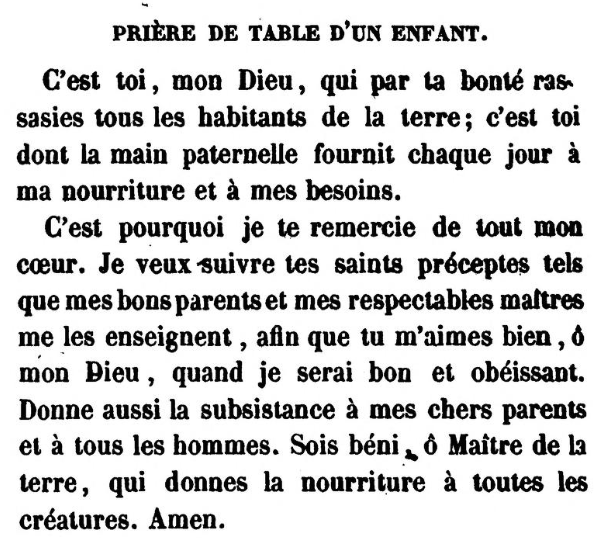Contributor(s): Shared on: Categories: Tags: | Source (French) | Translation (English) |
|---|
Prière avant l’instruction.
|
Prayer before school. |
Seigneur notre Dieu, tu nous as donné l’intelligence pour apprendre; tu nous as commandé le travail pour nous rendre utiles à nous-mêmes et aux autres. Nous promettons aujourd’hui d’être attentifs et dociles aux leçons de nos bons maîtres qui nous instruisent en ton nom, afin qu’il te plaise, ô Seigneur, d’éclairer notre intelligence et de bénir notre travail. Amen.
|
Lord our God, you have given us the understanding to learn; you have commanded us to work to make us useful to ourselves and to others. Today we promise to be attentive and obedient to the lessons of our good teachers who instruct us in your name, so that it may please you, O Lord, to enlighten our minds and bless our work. Amen. |
Source(s)
 Jonas Ennery (Jan. 2, 1801, Nancy - May 19, 1863, Brussels) was a French deputy. He was for twenty-six years attached to the Jewish school of Strasbourg, of which he became the head. In collaboration with Hirth, he compiled a Dictionnaire Général de Géographie Universelle (4 vols., Strasburg, 1839–41), for which Cuvier wrote a preface. Soon afterward he published Le Sentier d'Israël, ou Bible des Jeunes Israélites (Paris, Metz, and Strasburg, 1843). At the request of the Société des Bons Livres he took part in the editorship of Prières d'un Cœur Israélite, which appeared in 1848. In 1849, despite anti-Jewish rioting in Alsace, Ennery was elected representative for the department of the Lower Rhine, and sat among the members of the "Mountain." He devoted his attention principally to scholastic questions. After the coup d'état he held to his socialist republican views and resisted the new order of things. For this, in 1852 he was exiled from France for life. He retired to Brussels, where he lived as a teacher until his death. Ennery's brother, Marchand Ennery, was the chief rabbi of Paris.  Arnaud Aron (March 11, 1807, in Sulz unterm Walde, Alsace – April 3, 1890), the Grand Rabbi of Strasbourg, began his Talmudic studies at an early age at Hagenau and continued them at Frankfort-on-the-Main. In 1830 he became rabbi of the small community of Hegenheim in Upper Alsace; and of Strasbourg in 1833. As he was under thirty, the age prescribed by law, he required a special dispensation to qualify for the office. In Strasbourg, Aron acquired the reputation of an eloquent and inspiring preacher and a zealous communal worker. He assisted in founding the School of Arts and Trades and took active interest in other useful institutions. In 1855 he convened an assembly of the rabbis of the department of the Lower Rhine for the consideration of religious questions. Aron was the author of the catechism used for confirmation as prescribed by the Consistory of Lower Alsace. In 1866 the French government acknowledged his services by appointing him a Knight of the Legion of Honor. In 1870, while Strasbourg was besieged, it was he, together with the archbishop, who raised the white flag on the cathedral. Subsequently he was decorated by the German emperor. Aharon Varady (M.A.J.Ed./JTSA Davidson) is a volunteer translator for the Open Siddur Project. If you find any mistakes in his translations, please let him know. Shgiyot mi yavin; Ministarot Naqeni שְׁגִיאוֹת מִי־יָבִין; מִנִּסְתָּרוֹת נַקֵּנִי "Who can know all one's flaws? From hidden errors, correct me" (Psalms 19:13). If you'd like to directly support his work, please consider donating via his Patreon account. (Varady also transcribes prayers and contributes his own original work besides serving as the primary shammes for the Open Siddur Project and its website, opensiddur.org.) Read a comment / Leave a comment (moderated) Works of related interest: |












Leave a Reply